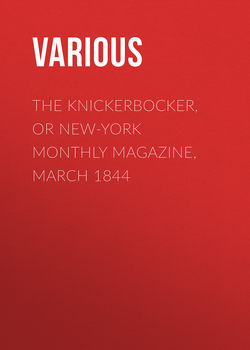The Knickerbocker, or New-York Monthly Magazine, March 1844

Реклама. ООО «ЛитРес», ИНН: 7719571260.
Оглавление
Various. The Knickerbocker, or New-York Monthly Magazine, March 1844
WHAT IS TRANSCENDENTALISM?
LINES SENT WITH A BOUQUET
THE ALMS HOUSE
APOSTROPHE TO HEALTH
ISABEL
ONE READING FROM TWO POETS
WHERE IS THE SPIRIT-WORLD?
THE TYRANNY OF AFFECTION
THE FRATRICIDE’S DEATH
A RHAPSODY
SICILIAN SCENERY AND ANTIQUITIES
NUMBER TWO
STANZAS
WRITTEN AT BEVERLY, MASSACHUSETTS. BY REV. WILLIAM B. TAPPAN
THE QUOD CORRESPONDENCE
Harry Harson
CHAPTER XXII
CHAPTER TWENTY-THIRD
NIGHT AND MORNING
THE LEGEND OF DON RODERICK.6
ANACREONTIC
LITERARY NOTICES
EDITOR’S TABLE
THE EASIEST WAY OF DISCHARGING A SONNET
SONNET I.—NAPOLEON
SONNET II.—THE HOTEL DE VILLE
SONNET III.—ETERNITY OF NATURE
SONNET IV.—BLISS IN GRIEF
SONNET V
TINGQUA’S TEARS
Отрывок из книги
It is not my purpose in the following narrative to point out all the evils arising from the modern practice of relieving the wants of the poor and destitute which prevails in this country and in England, where the arm of the law compels that pittance which should be the voluntary donation of benevolence; one consequence of which system is, that the poor claim support as a debt due from society at large, and feel no gratitude toward any of the individuals paying the tax. The payer of the tax, on the other hand, feeling that he can claim no merit for surrendering that which is wrung from him by force, and expecting no thanks for the act, and knowing that in many cases it operates as a bounty on idleness, hates the ungrateful burthen thus imposed upon him, and strives to reduce it to the least possible amount. In this way the ties which should bind together the poor and the rich are sundered. The benevolence of the patron and the gratitude of the dependent, which formerly existed, is changed to dislike and suspicion on the one part, and envy and ingratitude on the other.
Doubtless one design of Providence in suffering want and misery to exist in the world, is that the benevolent virtues should be kept in exercise. He who was benevolence itself, seemed thus to think, when he said: ‘The poor ye have always with you.’ But man in his selfishness virtually says: ‘The poor we will not have with us; we will put them out of our sight.’ For in many towns in New-England, and probably in other States, it is customary to contract with some individual for their support; or, in other words, to sell them by auction, to him who will support them by the year, for the least sum per head. To illustrate some of the results of this system, the following incidents are related from memory, having been witnessed by me in my native place (an interior town in New-England) at an age when the feelings are most susceptible. And so deep was the impression then made on my mind, that I am enabled to vouch for the accuracy of the details.
.....
‘I am quite satisfied with my experiment,’ replied Dr. Kent; ‘but I will confess (you know I am a candid man) that the result makes me feel a little serious.’ Dr. Kent knew, as we all have an opportunity of knowing, that a danger, however startling, for which we are at once provided with a remedy, is soon scorned; that it must stare us very decidedly in the face, before we are willing to appreciate the said remedy. ‘Yes,’ continued he. ‘I had no idea of the deep root the disease had taken.’
‘Good heavens! my friend,’ exclaimed Mr. Lee, grasping Dr. Kent’s hand in the utmost agitation; ‘and the remedy you thought of—is the case too serious for it to be available?’
.....